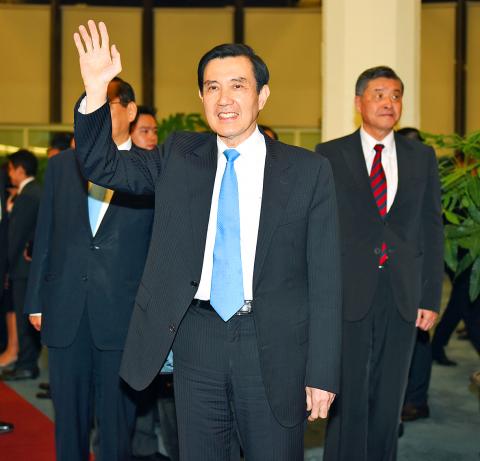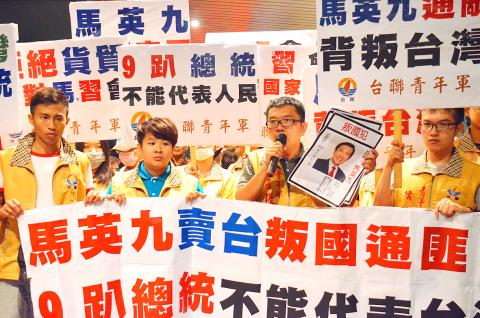In response to criticism over his meeting in Singapore with Chinese President Xi Jinping (習近平), President Ma Ying-jeou (馬英九) defended his performance while on board a flight back to Taiwan, which arrived at Taiwan Taoyuan International Airport early yesterday morning.
During the flight, Ma told reporters that the most significant result of his meeting with Xi was that leaders from the two sides of the Taiwan Strait had finally met and expressed their willingness to jointly discuss relevant issues.
“There are too many problems across the Strait that need to be dealt with. While a number of them have been resolved over the past few years, there are still many left, which is why we require a communication platform at a higher level,” Ma said, adding that the meeting was just a first step.

Photo: CNA
Asked how he felt about Xi’s response to Taiwanese concern over the threat China’s military poses to Taiwan, Ma said he was “not very satisfied” with Xi’s answer that the deployments did not target Taiwan.
“I told Xi that Taiwanese are rather concerned about the issue and hope China could make some gestures of goodwill... While I am not content with Xi’s response, at least I started the dialogue and I will bring up the matter again if given the opportunity in the future,” Ma said.
Ma added that he said everything he “was supposed to say” in front of Xi, including two mentions of the Republic of China (ROC) Constitution, as well as one mention each of the ROC and “one China, different interpretations.”

Photo: Chiu I-tung, Liberty Times
However, Xi did not make any significant reactions to his references to the ROC, Ma said, adding that he did not say “ROC president” during their meeting.
Shrugging off Democratic Progressive Party (DPP) presidential candidate Tsai Ing-wen’s (蔡英文) criticism of the meeting’s outcome, Ma said he had clearly mentioned “one China, different interpretations” and the so-called “1992 consensus” — a term former Mainland Affairs Council chairman Su Chi (蘇起) admitted making up in 2000 that refers to a tacit understanding between the Chinese Nationalist Party (KMT) and the Chinese government that both sides acknowledge there is “one China,” with each side having its own interpretation of what “China” means.
“‘One China, different interpretations’ means we can have different interpretations of the term ‘one China,’ while the ‘1992 consensus’ allows both sides to verbally state their respective interpretations of what ‘one China’ means,” Ma said.
“This is what gives us room [to maneuver]. Without this space, why would it be called the ‘1992 consensus?’” he added.
In regards to his performance at the meeting, Ma said he fulfilled nearly all of his original objectives, including bringing up the “1992 consensus”; “one China, different interpretations”; and the Constitution’s prohibition on remarks such as “two Chinas,” “one China, one Taiwan” and Taiwanese independence.
“Some have misunderstood my words as an attempt to fawn to the People’s Republic of China, but it was not. These terms are forbidden by our own Constitution,” Ma said.
Meanwhile, Premier Mao Chi-kuo (毛治國) said the Ma-Xi meeting had major historic significance, as both leaders took an important first step toward more institutionalized meetings in the future. Mao made the remarks yesterday afternoon while visiting the Taipei International Travel Fair, at which he met with travel industry representatives.
“This historic event has drawn global attention, and we, the people in Taiwan, should be united to tell the world about the importance of having peaceful cross-strait relations,” Mao said. “This is also an opportunity to let the world know about the contributions made by Taiwanese to peaceful development in the Asia-Pacific region.”
When asked if Chinese tourists would be allowed to make transit stops in Taiwan while he remains in office, Mao said that is “one of the follow-up issues that we will have to work on.”

SECURITY: As China is ‘reshaping’ Hong Kong’s population, Taiwan must raise the eligibility threshold for applications from Hong Kongers, Chiu Chui-cheng said When Hong Kong and Macau citizens apply for residency in Taiwan, it would be under a new category that includes a “national security observation period,” Mainland Affairs Council (MAC) Minister Chiu Chui-cheng (邱垂正) said yesterday. President William Lai (賴清德) on March 13 announced 17 strategies to counter China’s aggression toward Taiwan, including incorporating national security considerations into the review process for residency applications from Hong Kong and Macau citizens. The situation in Hong Kong is constantly changing, Chiu said to media yesterday on the sidelines of the Taipei Technology Run hosted by the Taipei Neihu Technology Park Development Association. With

CARROT AND STICK: While unrelenting in its military threats, China attracted nearly 40,000 Taiwanese to over 400 business events last year Nearly 40,000 Taiwanese last year joined industry events in China, such as conferences and trade fairs, supported by the Chinese government, a study showed yesterday, as Beijing ramps up a charm offensive toward Taipei alongside military pressure. China has long taken a carrot-and-stick approach to Taiwan, threatening it with the prospect of military action while reaching out to those it believes are amenable to Beijing’s point of view. Taiwanese security officials are wary of what they see as Beijing’s influence campaigns to sway public opinion after Taipei and Beijing gradually resumed travel links halted by the COVID-19 pandemic, but the scale of

A US Marine Corps regiment equipped with Naval Strike Missiles (NSM) is set to participate in the upcoming Balikatan 25 exercise in the Luzon Strait, marking the system’s first-ever deployment in the Philippines. US and Philippine officials have separately confirmed that the Navy Marine Expeditionary Ship Interdiction System (NMESIS) — the mobile launch platform for the Naval Strike Missile — would take part in the joint exercise. The missiles are being deployed to “a strategic first island chain chokepoint” in the waters between Taiwan proper and the Philippines, US-based Naval News reported. “The Luzon Strait and Bashi Channel represent a critical access

Pope Francis is be laid to rest on Saturday after lying in state for three days in St Peter’s Basilica, where the faithful are expected to flock to pay their respects to history’s first Latin American pontiff. The cardinals met yesterday in the Vatican’s synod hall to chart the next steps before a conclave begins to choose Francis’ successor, as condolences poured in from around the world. According to current norms, the conclave must begin between May 5 and 10. The cardinals set the funeral for Saturday at 10am in St Peter’s Square, to be celebrated by the dean of the College